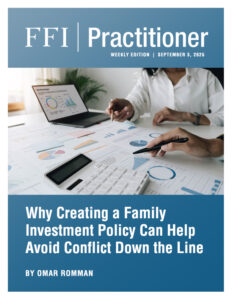
View this edition in our enhanced digital edition format with supporting visual insight and information.
Thank you to Omar Romman for this FFI Practitioner edition, suggesting that establishing family investment policies with clients can help mitigate conflicts before they start. The article discusses different scenarios that might arise and how advisors can help clients navigate their complexities.
Charlie,* second-generation owner and CEO of a family industrial manufacturing business, didn’t think twice when he was offered the chance to invest in a growing medical technology business. The opportunity came from someone he had met at an industry conference, and Charlie felt good about the business plan. His investment paid off handsomely. Within a few years, his personal wealth had increased substantially, and he was able to start enjoying some of the spoils of that investment.
His good fortune did not go unnoticed by other family members. Charlie’s father had started the business thirty years ago and had taken pains to ensure that all three of his children would be equal owners one day. Charlie was the only one of his siblings working in the business, but he and his siblings had taken their roles as future co-owners seriously and made all significant investment decisions for the business together.
What they had not discussed, however, was how the family would treat opportunities for personal investments. After it became apparent how successful his investment had been, Charlie began to sense some tension in meetings with his siblings that he had never noticed before. He hadn’t invested any family money, just his own, but there were suggestions that he was offered the opportunity because of his position in the company. Did his family resent his success?
Charlie’s scenario is not uncommon. The problem isn’t that individual family members have opportunities to invest—it’s that when family members take advantage of those opportunities absent a family investment policy, resentment and perceived unfairness can develop. Many owner groups have never taken the time to create a family investment policy that lays out the “rules” for how the family will deal with investment opportunities that are “outside” of the business. There is no one right way to handle investment opportunities; the plan should depend on the family’s individual needs. But what is necessary is discussion and agreement on what that policy should be.
In Charlie’s case, as tensions built, conflict started showing up in other areas. His siblings began to scrutinize decisions he was making for their business more closely. They began to demand more distributions as a way to level the “wealth” playing field. Their willingness to invest in new innovations for the family business also waned, feeling resentful that they had to fund the future growth of the company while Charlie was able to profit elsewhere. Eventually, the conflict became so bad that when their father was preparing to retire, he made the decision to sell the business rather than risk seeing the conflict among his children continue. After the business was sold, the siblings began to drift further apart. They barely see each other now. Things might have turned out differently if the family had agreed on a family investment policy in advance.
Do client families have an investment policy that is separate from their business investment policy? If they don’t, that may be an important conversation to work through with clients, before anyone is presented with an opportunity that could divide the family. As with many family business policies, there is no one size fits all. A variety of approaches can work well, depending on the family situation.
Various Scenarios to Anticipate
Client families may not have the good fortune to be presented with a one-time-only opportunity for a blockbuster investment, but conflict can arise in various areas.
- Wealth disparity: A family member makes an investment in a business without other family members participating, creating wealth for one family member or a group of family members and not others. This can create resentment, which can be exacerbated if the opportunity came as a result of their ownership or involvement in the business.
- Obligation to fund family ventures: Family members, including spouses or next generation family members, may use family assets to start a business, which, if it fails, can cause resentment.
- Lost opportunities: Family members can sometimes pass on or be blocked from pursuing lucrative business opportunities because they are worried about causing resentment from other family members.
Getting Ahead of a Problem
If a client family does not yet have an investment policy in place, there’s no time like the present to create one. An effective family investment policy should have several components:
- A clear definition of which assets are “family assets” and which are “individual assets.” It is important to define which assets require group decision-making and which assets are individually controlled. This is especially important in complicated ownership structures or when trusts are involved.
- Rules governing how “family assets” are invested in new opportunities. Specifically, who makes the decision, what types of investments can be made, limits on investments, etc. For example, can a family that owns an oil and gas business invest in oil and gas businesses in another location?
- Rules governing the family’s investment in opportunities led by family members. These include if and how the family will allow investments in ventures led by family members.
- What rules, if any, will govern the investment of “individual assets”? Here are some questions to consider as examples:
- If an opportunity comes to a family member, is he/she obligated to offer that investment to the rest of the family through a right of first refusal?
- What constitutes an investment that might present a conflict of interest that may be disallowed? For example, can an individual family member invest in a company that is a customer or supplier of the family business?
- How will family members working in the business balance their responsibilities in the business with the time they spend pursuing and managing personal investments?
To provide a different client family case, the family members agreed to a policy where all new investments that came to the family, collectively or individually, had to be presented to the family business investment committee first. If the committee passed on the investment, the individual to whom the investment came was free to invest. Their rules were clear, and while they may be different for other families, the clarity has helped them avoid conflict over opportunities that have been presented to them.
Spending time creating an investment policy with client families—before they need it—will help avoid conflict and resentment down the line. Advisors can see families opt for solutions at both ends of the spectrum (and many in between the extremes), ranging from “We invest in everything together,” to “We are all free to investment individually.” As long as family members know the rules, they reduce the chances of conflict over potentially lucrative and exciting opportunities down the road.
–
* The name, location, and all other identifying details have been disguised.

Omar Romman is a partner in BanyanGlobal Family Business Advisors, working closely with family businesses around the world to support them in the design of governance strategies, ownership structures, and succession plans. He also supports business families with the assessment and development of next-generation leaders and with the establishment and professionalization of family offices. https://banyan.global/team-member/omar-romman/

View this edition in our enhanced digital edition format with supporting visual insight and information.





